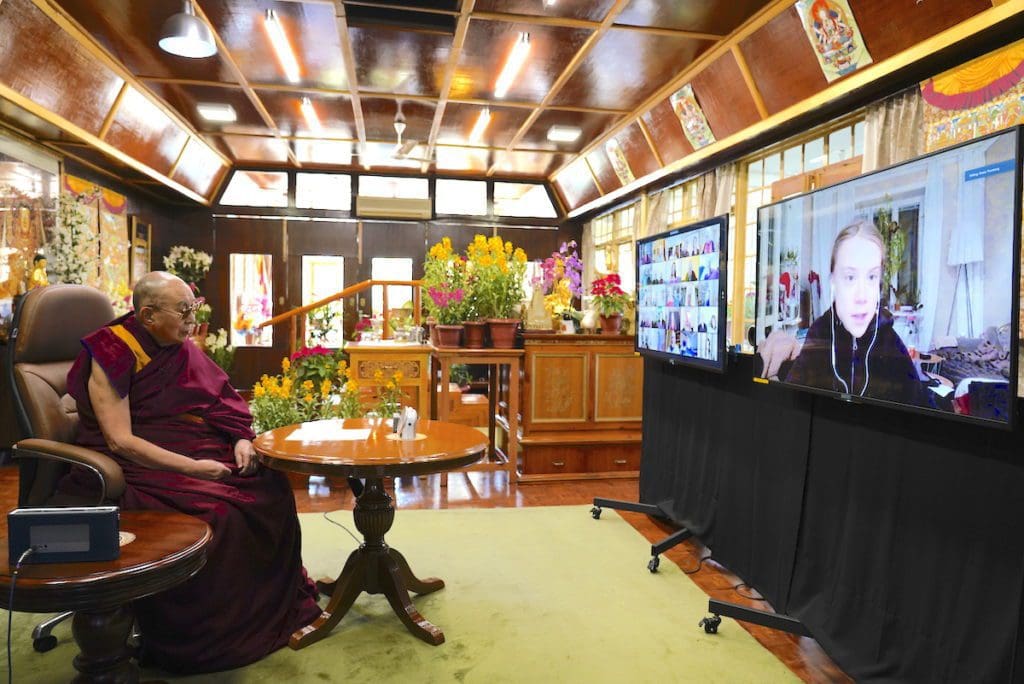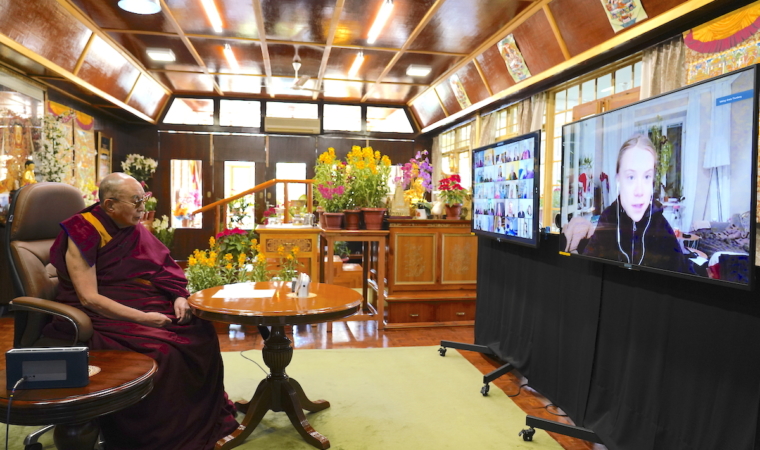
The Dalai Lama and climate activist Greta Thunberg met—for the first time—alongside prominent climate scientists to deliver a shared message: We must act swiftly to address climate change, and particularly the threat of climate feedback loops, before it’s too late.
An audience spanning the globe tuned in to the free, livestream event hosted by the Mind & Life Institute on January 9 (January 10 in the Eastern Hemisphere). Their conversation centered on the dire implications of climate feedback loops as powerfully illustrated in a new educational films series: Climate Emergency: Feedback Loops. Narrated by Richard Gere, the five short films show the impact of climate feedback loops on Forests, Permafrost, Atmosphere, and Albedo.
Mind & Life President Susan Bauer-Wu summed up the event’s goal as advancing solutions through presenting three complementary perspectives—science, secular ethics, and social action.
Moderator Diana Chapman Walsh, President Emerita of Wellesley College, opened the discussion by sharing a letter His Holiness wrote to Greta in 2019. “I am also an ardent supporter of environmental protection,” he wrote, adding “It is encouraging to see how you have opened the eyes of the world to the urgency to protect our planet.” The letter is reprinted in the opening pages of his new book, Our Only Home: A Climate Appeal to the World.
Asked what inspired him to write the letter, His Holiness responded, “It’s really encouraging [to see] younger members of humanity showing genuine concern for our future, for our planet.” We have to move beyond thinking about my community, my nation, and divisions based on geography, race, religion, and language, he pointed out. “The time has come to think about humanity and the oneness of seven billion human beings.”
Greta spoke out passionately about the crisis of climate feedback loops during a presentation at the Human Climate Action Summit in 2019. What are climate feedback loops? As the planet warms due to greenhouse gas emissions, described Chapman Walsh, hotter temperatures then feed back into nature’s own systems to cause more heat-trapping gasses to be released. A potent example is the thawing of permafrost and the release of stored carbon that results, setting off a self-perpetuating cycle.
“Right now, there’s a huge lack of awareness and the science isn’t being discussed that much,” said Greta. “We cannot solve the climate emergency without taking these feedback loops into account. Understanding them is a crucial step.”
“We cannot solve the climate emergency without
taking these feedback loops into account.”
-Greta Thunberg
Scientists Susan Natali, Arctic Program Director at the Woodwell Climate Research Center, and William Moomaw, Professor Emeritus of International Environmental Policy at Tufts University, shared examples—brought to life in film clips—of how climate feedback loops associated with the thawing of permafrost in the Arctic and destruction of forests in areas like the Amazon, are accelerating warming trends.
Part of the challenge with feedback loops is that scientists are still working to measure and assess their full impact. As a result, the threat they pose is not fully accounted for in global carbon budgets set by policymakers. “We’re underestimating what it takes because we’re not looking at the risk,” said Natali.
Viewers of the 75-minute discussion were given a clear mandate. Said Greta, “If I could ask anything of you, it would be to educate yourself, to learn as much as you possibly can.” As important is taking action to reduce carbon emissions and supporting leaders who are active on this issue. “We need to create a social movement; we need to shift the social norm,” she added.
The Dalai Lama cautioned against taking the bounty of the earth and its resources for granted. “We need to think seriously about our lifestyle and today’s reality,” he said, pointing to the role of Greta and thousands of today’s young activists in speaking out for positive change. “Leaders like you are very, very important,” he said. “You can do much to lift up awareness.”
To learn more about climate feedback loops and actions you can take, watch the recording of “A Conversation on the Crisis of Climate Feedback Loops” and visit our resources page. View the short films at Climate Emergency: Feedback Loops.
*****
The conversation with the Dalai Lama, Greta Thunberg, and leading scientists is just one of the ways Mind & Life seeks to strengthen the human-earth connection. Through our grantmaking, events, and digital offerings, we explore how the union of contemplative wisdom and science can lead to greater awareness of the interconnectedness of all life—and action—to support and sustain both individuals and the earth’s living systems. An example is our 2021 Summer Research Institute, “The Mind, the Human-Earth Connection, and Climate Change” when we’ll look at how to re-awaken our relationship with the earth and all its inhabitants, while re-igniting our collective responsibility as stewards of our planetary future.



